Eating disorders are a group of conditions that include anorexia nervosa, bulimia nervosa, binge eating disorder, restrictive food intake disorder, pica, and ruminative disorder, among others.
When searching for the right treatment for an eating disorder, the process of choosing a good therapist can at times be overwhelming.
In this article, we’ve looked at platforms that can connect you with an eating disorder therapist, online or in person. We’ve also explained the most common therapeutic approaches used for treating different eating disorders.
Want to skip right to the suggestions for eating disorder therapists? Here are our 7 recommended therapy solutions:
- BetterHelp
- Teen Counseling
- Find-a-therapist.com
- Online-therapy.com
- Calmerry
- TalkSpace
- Eating Disorder Hope
Eating Disorder Therapist Near Me
Here are seven of the best places to find an eating disorder therapist, near you or online for people who feel more comfortable taking therapy at home due to their busy schedule.
| Povider | Good For | Location | Pricing |
|---|---|---|---|
| BetterHelp | Quick match with the right therapist four you | Online therapy | $65 to $90 per week (billed every 4 weeks) |
| Teen Counseling | Teens from ages 13-19 | Online therapy | $65 to $90 per week (billed every 4 weeks) |
| Find-a-therapist.com | Finding and contacting the right therapist for you | Online and in-person therapy | Varies depending on the counselor fee |
| Online-therapy.com | Finding licensed and experienced therapists with a Cognitive Behavioral Therapy (CBT) approach | Online therapy | $40/week to $88/week (including our 20% discount first month) |
| Calmerry | Depression therapy, online grief counseling, anxiety therapy, therapy for OCD, self-esteem therapy | Online therapy | $49.50 to $73.75 per week (billed monthly) |
| TalkSpace | Depression, anxiety, bipolar disorder, OCD, PTSD, LGBTQIA+ therapy | Online therapy | Varies according to insurance coverage or self-pay options |
| Eating Disorder Hope | Finding an eating disorder therapists near you | Online and in-person therapy in the U.S. | Varies depending on the counselor fee |
1. BetterHelp
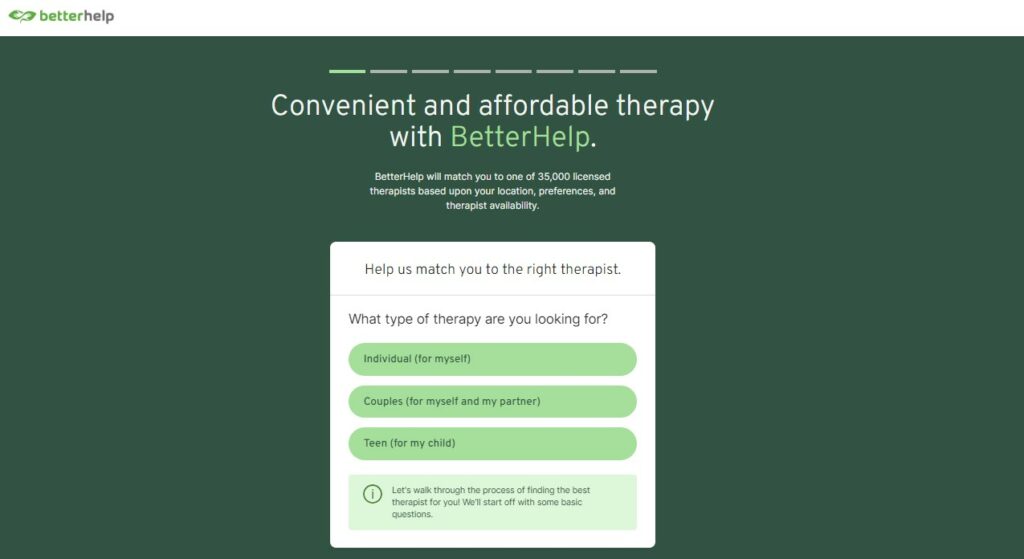
Explore emotional well-being with BetterHelp – your partner in affordable online therapy. With 30,000+ licensed therapists and plans starting from only $65 per week, BetterHelp makes self-care accessible to all. Complete the questionnaire to match with the right therapist.
- Good for: Quick match with the right therapist four you.
- Location: Online therapy.
- Pricing: $65 to $90 per week (billed every 4 weeks).
- Features: iOS and Android app available, message your therapist anytime, live sessions are scheduled weekly and done via live chat, phone, or video call.
BetterHelp is an online therapy platform that specializes in helping people suffering from many different kinds of mental health issues, including eating disorders. Each of their counselors and therapists are licensed, qualified professionals, with thousands of hours of therapy experience.
Read our BetterHelp review here.
2. Teen Counseling
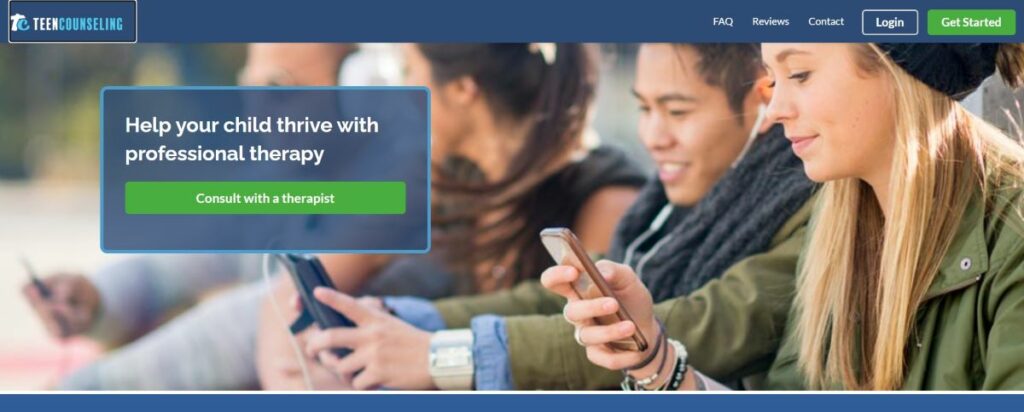
Nurture your teenager’s well-being through Teen Counseling. Tailored for ages 13-19, their online therapy begins at $65/week. This includes a weekly live session, the flexibility to message your therapist at any time, and the opportunity for parents to connect with therapists. Empower your teen’s journey today with Teen Counseling – start with their online questionnaire.
Note: We collaborate with top-tier mental health companies and receive advertising fees from purchases through the Teen Counseling links.
- Good for: Teens from ages 13-19.
- Location: Online therapy.
- Pricing: $65 to $90 per week (billed every 4 weeks).
- Features: The platform is designed to make finding a therapist easy, message your therapist anytime, live sessions are scheduled weekly and done via live chat, phone, or video call.
Teen Counseling is an online platform that provides counseling services specifically tailored for teenagers. The platform aims to address the unique challenges and concerns that teens may face during this critical stage of development, like eating disorders.
3. Find-a-therapist.com
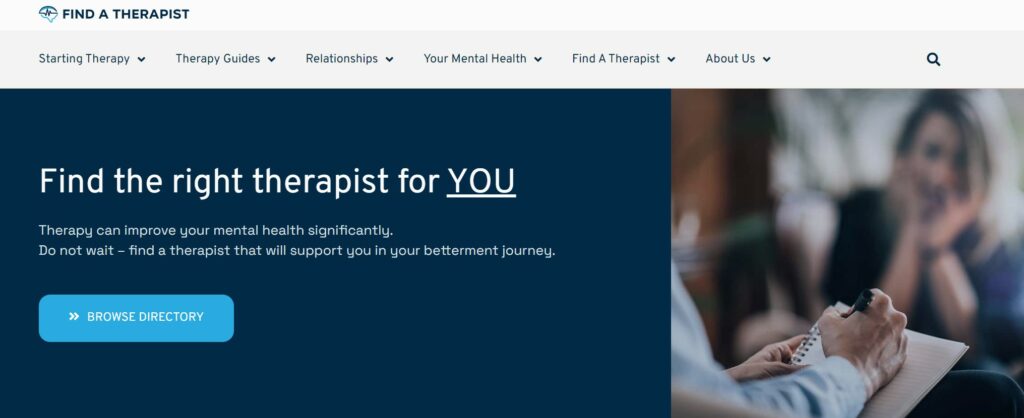
- Good for: Finding and contacting the right therapist for you.
- Location: Online and in-person therapy.
- Pricing: Varies depending on the counselor fee.
- Features: Filter your search, find accessible and effective online and in-person therapy, find guides on different types of therapy.
Find-a-therapist.com has a comprehensive directory where you can personalize your search to find the right therapist according to your preferences and needs. There you can find therapists like Bahadir Bozoglan, Regina Lazarovich, or Meghan Yahrling who have experience in addressing eating disorders.
4. Online-therapy.com
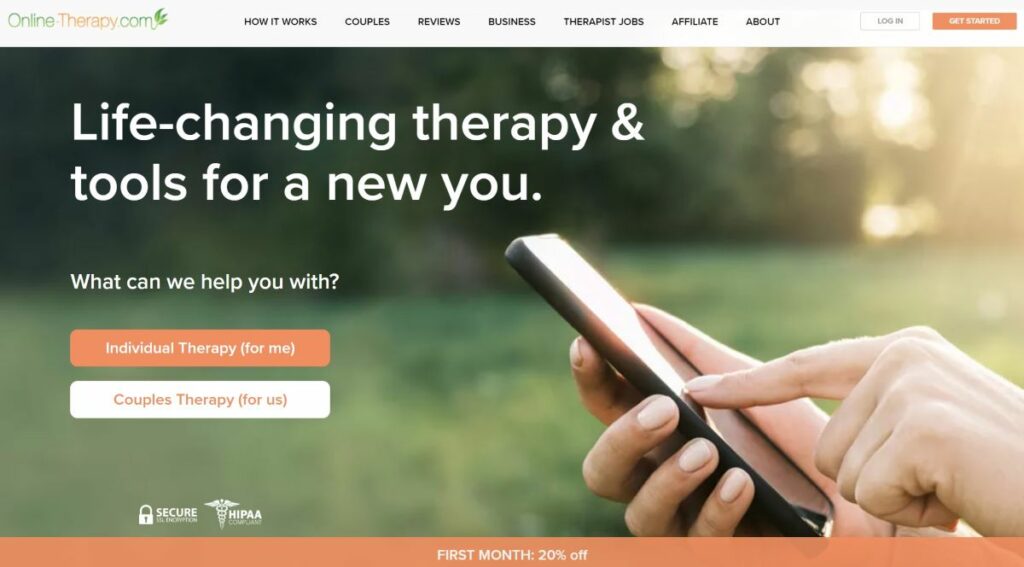
Discover transformative online therapy with Online-therapy.com. Through cognitive behavioral therapy (CBT), Online-therapy.com offers individual and couples support starting at $45/week. Engage in sessions via video, voice, or text for maximum flexibility. Fill out their online questionnaire to get started.
- Good for: Finding licensed and experienced therapists with a Cognitive Behavioral Therapy (CBT) approach.
- Location: Online therapy.
- Pricing: $40/week to $88/week (including our 20% discount first month).
- Features: Unlimited messaging with your therapist, including a daily journal and activity plan, yoga and meditation videos, and tests to see your progress.
Online-therapy.com has an extensive network of Cognitive Behavioral Therapists who offer their mental health services online. These professionals have experience in managing eating disorders and other mental health issues.
Read our online-therapy.com review here.
5. Calmerry

Embark on a journey of mental wellness with Calmerry. With diverse subscription options, starting at just $50, Calmerry makes prioritizing your mental health simple and accessible. You can message your therapist any day or schedule a live therapy session from the comfort of your home from any device.
- Good for: Depression therapy, online grief counseling, anxiety therapy, therapy for OCD, self-esteem therapy.
- Location: Online therapy.
- Pricing: $49.50 to $73.75 per week (billed monthly).
- Features: Message to your counselor anytime, text therapy and video therapy according to the plan you choose, free counselor switching.
On Calmerry you can be matched with an eating disorder therapist after you complete a short assessment. Once a therapist is assigned to start the therapy process with you, you can communicate with them via text or video call.
Read our comparison between Calmerry and BetterHelp here.
6. TalkSpace
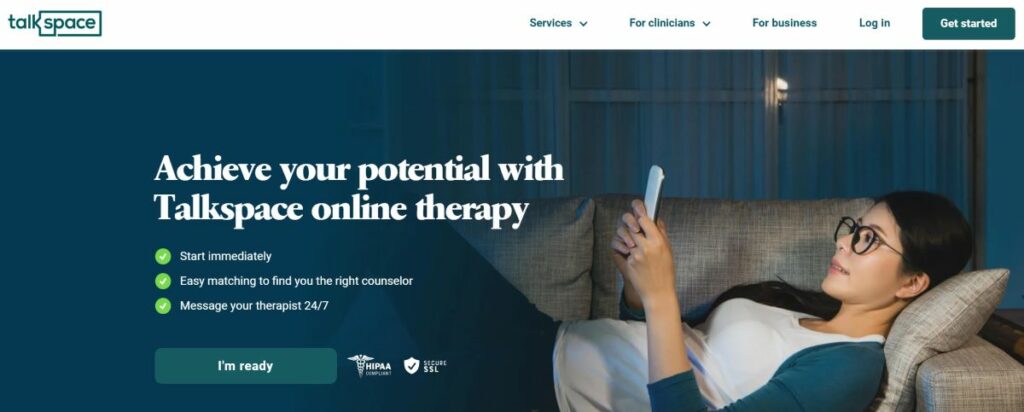
Tailored to individuals, couples, teens, and offering psychiatry services, Talkspace plans kick off at a wallet-friendly $69 per week. What’s more, many health insurances also cover their services, enhancing accessibility and affordability. Complete a questionnaire and get matched with the right therapist for you.
- Good for: Depression, anxiety, bipolar disorder, OCD, PTSD, LGBTQIA+ therapy.
- Location: Online therapy.
- Pricing: Varies according to insurance coverage or self-pay options.
- Features: Accepts insurance, pick your therapist from a list of recommendations, live video sessions and unlimited messaging with your therapist, medication management.
TalkSpace gives you a list of potential eating disorder therapists for you to choose after a short questionnaire. This platform accepts insurance, and in case you don’t feel comfortable with your therapist, you can switch anytime.
Read our TalkSpace review here.
7. Eating Disorder Hope

- Good for: Finding an eating disorder therapists near you.
- Location: Online and in-person therapy in the U.S.
- Pricing: Varies depending on the counselor fee.
- Features: Online community that provides information, education, support, and resources, find treatment centers in your area, find eating disorder support groups.
Eating Disorder Hope (EDH) has a directory that helps you find eating disorder therapists near you, as well as different inpatient and outpatient treatment facilities. EDH has gathered lists of available professionals, their contact information, addresses, the type of therapy they provide, the types of patients they serve, and the treatment settings offered.
Online vs. Face-to-face Eating Disorder Therapy

When searching for help for any kind of mental health issue, one of the most important things to do is carefully choose the right type of therapy for you.
In the busy world we live in, finding time for therapy can be challenging, especially if attending sessions requires commuting, sitting in traffic, and traveling long distances to your therapist. This is especially likely to be a problem if you live in a small town or city, with few therapists nearby who are qualified to help with eating disorders.
Some benefits of online therapy include the ability to better fit therapy in your schedule, the possibility of attending therapy wherever you are (including from the comfort of your home), and the ability to reach your therapist over text message when you’re feeling overwhelmed.
However, traditional therapy is still a better fit for some people, especially those who need face-to-face contact to open up, and who feel uncomfortable discussing their issues over the phone or computer.
Effectiveness of Online Therapy for Eating Disorders
According to the American Psychological Association, online therapy can be just as effective as traditional therapy, especially psychotherapeutic approaches, such as Cognitive-Behavioral Therapy, which is often used when treating eating disorders.
Research shows that CBT-based interventions can help with reducing the eating disorder psychopathology, and can also assist with preventing relapse to a degree.
However, these findings should be taken with caution. Researching the effectiveness of online therapy for treating eating disorders is a fairly new field and more data is needed to support the claims.
If you have a serious eating disorder that is affecting your physical and mental wellbeing, it’s crucial to seek help in person. Although psychotherapy is an important step in the process of overcoming an eating disorder, it’s often necessary to formulate a more holistic treatment plan, with the help of a dietician and possibly a doctor, as well as a psychologist.
Cost of Online vs. Face-to-face Therapy
One of the biggest benefits of online therapy is the price. For therapists who provide therapy online, the costs of the business are usually cheaper. They don’t have to rent an office, spend money on traveling, or pay for other personnel, like a receptionist.
For these reasons, online therapy often costs less than in-person therapy. This applies to eating disorder therapy as well.
For example, in-person Cognitive-Behavioral Therapy (CBT) usually costs $100 to $200 per session in the United States. To complete a course of CBT, you would typically have to attend approximately sixteen sessions, meaning you’d have to spend about $2000, or possibly more.
Online CBT costs significantly less, ranging from $65 to $90 per session, which sums up to $960 to $1440 for sixteen sessions, allowing you to save a significant amount of money.
Price-wise, the biggest downside of online therapy is that it’s sometimes not covered by insurance. Only some online therapy providers are covered under Employee Assistance Programs.
Therapies Used to Treat Eating Disorders

Treatment plans for eating disorders vary greatly based on the type of the disorder, the severity of the condition, and the presence of co-occurring disorders.
Since eating disorders can be quite complex, the treatment will often include a range of professionals working together to provide proper care. One part of the treatment will include therapy.
In this part of the article, we will look at the most common therapies used in treating eating disorders.
Cognitive-Behavioral Therapy (CBT)
Eating disorders commonly involve unhealthy thought patterns regarding food, weight, and appearance.
Cognitive-Behavioral Therapy is a therapeutic approach that identifies unhelpful and unhealthy beliefs and thought patterns that might contribute to the persistence of the eating disorder. This approach has been the most effective in treating bulimia nervosa and binge eating disorder.
A typical CBT-based eating disorder treatment might include:
- Meal planning
- Documenting thoughts and feelings before and after meals
- Learning strategies to prevent compensatory behaviors such as bingeing
- Psychoeducation
- Relapse prevention
An example of negative thinking patterns that CBT-based therapies challenge are thoughts such as “food is evil” or “food is dangerous.” CBT discourages these negative thinking patterns and establishes healthier ones in their place.
Two more CBT-based therapies often used when treating eating disorders are:
- Acceptance and Commitment Therapy (ACT), which has the goal of helping you accept your feelings and change your behavior to align with your core values.
- Dialectical Behavior Therapy (DBT), which focuses on helping you learn how to manage difficult emotions, such as stress associated with over or under-eating.
Family-based Treatment (FBT)
Family-based treatment has been proven to be one of the most effective treatments for teens and adults with anorexia nervosa. This approach doesn’t only treat the person suffering from an eating disorder, but also sees family members as a vital part of the treatment.
At the beginning of FBT, the entire family sits down for a meal, and the therapist observes their eating habits. Parents are then educated and empowered to take charge of their child’s meals. They prepare, serve and supervise the child’s meals.
They are also responsible for monitoring their child after the meal to prevent compensatory behaviors, such as purging.
The therapy has three steps:
- Full parental control, during which all energy-dense meals are planned and supervised by parents,
- The gradual return of control to the child happens when they have gained back some of the lost weight, and unhealthy behaviors are mostly under control,
- Establishing autonomy, during which the child is well enough to gain back control over his or her eating habits. This is the part of the treatment where co-occurring mental health issues can be addressed.
Interpersonal Psychotherapy (IPT)

This psychotherapeutic approach is one of the most effective treatments for bulimia nervosa and binge eating disorder. During this treatment, the disorder will be explored in the context of social and interpersonal relationships.
Your therapist will help you understand how relationship issues (such as family conflict) might have contributed to your eating disorder, and help you and your family develop strategies that can improve your communication.
Specifically, this approach seeks to mend interpersonal relationships that may have suffered during/after the emergence of the eating disorder. It helps you to develop stronger, more supportive relationships that can serve to support you during difficult times, especially with your close family, or your partner.
Medical Care and Nutrition Therapy
Some cases of eating disorders can become severe, especially those that include significant weight loss, such as anorexia nervosa. The consequences of extreme weight loss are numerous and even life-threatening.
Malnourishment and low energy intake impact the entire body and the recovery has to be handled delicately. This is why a team of professionals has to work together to help the patient.
Treatment can be provided in outpatient and inpatient facilities and can involve medical care workers, nutritionists, dietitians, and therapists. Before you decide what sort of medical care would be right for you or your family member, or if you’re unsure whether or not medical care is necessary, make sure to contact your doctor.
When to Seek Help?
Seeking help for an eating disorder is crucial when you notice any signs or symptoms that may indicate a problematic relationship with food and body image.
Below are some signs that may suggest it’s time to seek help:
| Signs | Description |
|---|---|
| Extreme Weight Changes | Significant and unexplained weight loss or gain can be a sign of an eating disorder. |
| Obsession with Food, Dieting, or Body Image | Constant preoccupation with food, calories, dieting, or a distorted body image may indicate an issue. |
| Changes in Eating Habits | Drastic changes in eating habits, such as avoiding meals, eating excessively, or engaging in ritualistic behaviors around food, are red flags. |
| Physical Symptoms | The presence of physical symptoms like dizziness, fatigue, weakness, hair loss, or gastrointestinal issues may be related to an eating disorder. |
| Emotional Changes | Noticeable shifts in mood, increased irritability, social withdrawal, or anxiety related to food and body image can be concerning. |
| Secretive Behavior | Hiding food, eating in secret, or avoiding meals with others can be signs of disordered eating. |
| Impact on Daily Functioning | If the behaviors associated with the eating disorder begin to interfere with daily life, school, work, or relationships, it’s time to seek help. |
Conclusion
Eating disorders are serious mental health conditions, and early intervention is key to successful treatment. If you or someone you know is experiencing symptoms of an eating disorder, consider reaching out to a healthcare professional, therapist, or eating disorder specialist for guidance and support.
If you’re still not sure how to find the right eating disorders therapist or you have any questions, contact us and we’ll get back to you.





